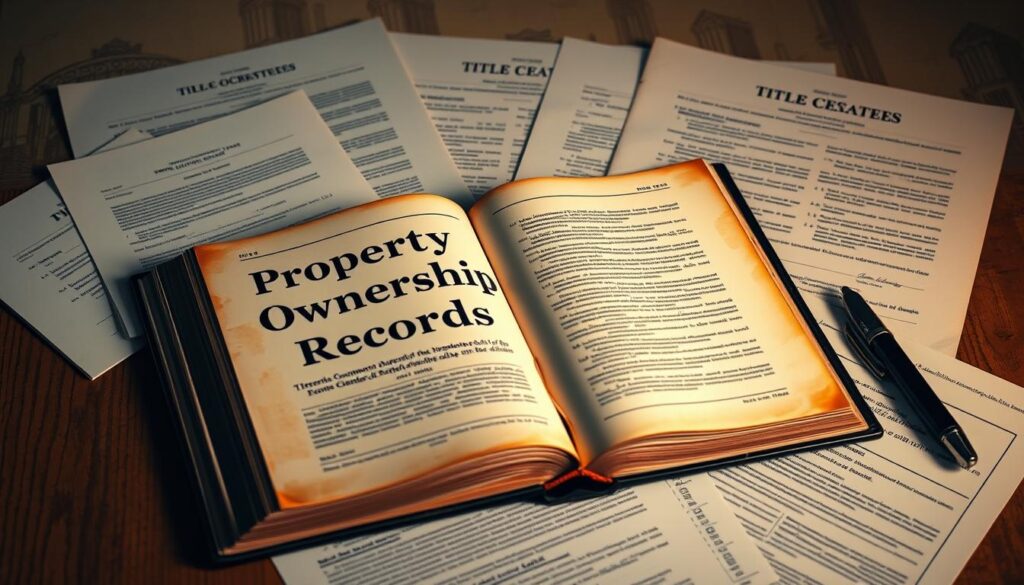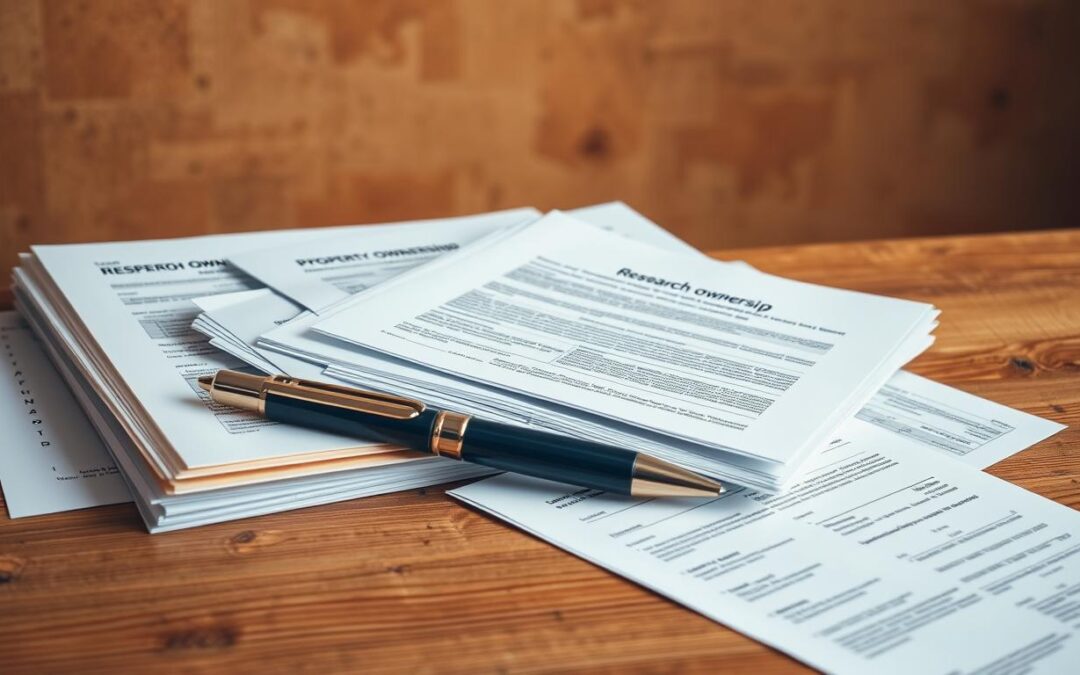Finding out who owns a property is key for real estate investors and curious people. Oak Real Estate knows how complex this can be. Property records can give you important details about real estate, helping you make smart choices.
Looking into property ownership needs a good plan and knowing where to look. Whether you’re checking out a property for investment or solving a mystery, finding the right records is vital.
This guide will show you how to find property owners. We’ll cover both old-school and new ways to search, making your research easier.
 Property ownership in the United States is complex. It involves many layers of documents and laws. These systems protect both buyers and sellers.
Knowing about property ownership records and deeds is key for real estate. These documents help establish rights, transfer property, and keep title clear.
Property ownership in the United States is complex. It involves many layers of documents and laws. These systems protect both buyers and sellers.
Knowing about property ownership records and deeds is key for real estate. These documents help establish rights, transfer property, and keep title clear.
 Searching for property ownership is key for many. It helps buyers, investors, and researchers find important details. This is before they make big decisions.
There are many reasons to do a real estate title search:
Searching for property ownership is key for many. It helps buyers, investors, and researchers find important details. This is before they make big decisions.
There are many reasons to do a real estate title search:
 Understanding how to search for property ownership is key. There are different methods to help you find what you need.
Understanding how to search for property ownership is key. There are different methods to help you find what you need.
 County assessor records are key for anyone looking into land records. They give detailed info on who owns property. This helps people find important facts about real estate.
There are several ways to use county records:
County assessor records are key for anyone looking into land records. They give detailed info on who owns property. This helps people find important facts about real estate.
There are several ways to use county records:
 Today’s technology lets us find property info fast. Property databases give deep insights that were hard to get before.
Today’s technology lets us find property info fast. Property databases give deep insights that were hard to get before.
 Property tax records have layers of information. They show more than just tax payments. They also reveal property ownership, value, and local assessment practices.
Property tax records have layers of information. They show more than just tax payments. They also reveal property ownership, value, and local assessment practices.
Respecting legal limits is essential in property searches. Using personal property info without permission can lead to serious legal trouble. Experts suggest using licensed title search services to follow all laws.
Key Takeaways
- Property ownership searches can be conducted through multiple channels
- Online and offline resources offer different approaches to finding property owners
- County records remain a primary source of property ownership information
- Digital databases can expedite property ownership research
- Understanding local regulations is key for effective property searches
Understanding Property Ownership in the United States
 Property ownership in the United States is complex. It involves many layers of documents and laws. These systems protect both buyers and sellers.
Knowing about property ownership records and deeds is key for real estate. These documents help establish rights, transfer property, and keep title clear.
Property ownership in the United States is complex. It involves many layers of documents and laws. These systems protect both buyers and sellers.
Knowing about property ownership records and deeds is key for real estate. These documents help establish rights, transfer property, and keep title clear.
Types of Property Deeds
There are different types of property deeds. Each offers different levels of protection and legal effects:- General Warranty Deed: Gives the most protection to buyers
- Special Warranty Deed: Offers some protection against certain title issues
- Quitclaim Deed: Transfers ownership with little guarantee
Legal Aspects of Property Ownership
To be valid, property ownership needs specific documents. These include:- Written documents
- Clear names of who is giving and who is getting the property
- Words that show the property is being transferred
- The seller’s signature
The Role of Property Records
Property records are vital for transparency and fraud prevention. In 2023, the FBI saw about 9,500 cyber-related real estate fraud complaints. These led to over $145 million in losses. Digital systems help manage property deeds, making ownership chains easier to verify.Protecting your property starts with understanding the nuances of ownership documentation and maintaining accurate records.Digital property deeds are becoming more common. Many states now accept electronic records as equal to paper ones, thanks to laws like the E-SIGN Act.
Common Reasons for Property Ownership Search
 Searching for property ownership is key for many. It helps buyers, investors, and researchers find important details. This is before they make big decisions.
There are many reasons to do a real estate title search:
Searching for property ownership is key for many. It helps buyers, investors, and researchers find important details. This is before they make big decisions.
There are many reasons to do a real estate title search:
- Identifying off-market properties not listed on traditional real estate platforms
- Verifying legal ownership during private sales
- Conducting due diligence for development projects
- Researching possible investment opportunities
- Understanding property history and any issues
- Find property ownership details fast
- Check for legal issues
- Look at property value and history
- Explore investment chances
Understanding property ownership is more than just gathering information—it’s about making informed real estate decisions.Researchers and experts use these searches to learn about local markets. They track development chances and ensure clear property deals.
How Do I Find Out Who Owns a Property
Finding out who owns a property can seem hard, but there are many ways to do it. Online tools make it easier for buyers, investors, and curious people. You can now search for property ownership easily. Understanding how to search for property ownership is key. There are different methods to help you find what you need.
Understanding how to search for property ownership is key. There are different methods to help you find what you need.
Basic Search Methods
For a first-time search, you have a few easy options:- County Assessor’s Website: Most counties offer free online property records
- State and Local Government Databases: These often have property ownership info
- Local Property Tax Offices: They can give you immediate ownership details
Advanced Search Techniques
If basic searches don’t work, try these advanced methods:- Check different online property search tools
- Use real estate sites like Zillow and Redfin
- Look into historical deed records
- Use GIS (Geographic Information System) mapping tools
Professional Search Services
For tough searches, professional services can help a lot. Title companies charge $75 to $200 for detailed searches. They use special databases to find property owners.Pro Tip: Always check information from different sources to make sure it’s right.Choosing the right method depends on your needs, time, and budget. Online tools have changed how we find property ownership information.
Using County Records for Property Search
 County assessor records are key for anyone looking into land records. They give detailed info on who owns property. This helps people find important facts about real estate.
There are several ways to use county records:
County assessor records are key for anyone looking into land records. They give detailed info on who owns property. This helps people find important facts about real estate.
There are several ways to use county records:
- Online county record portals
- In-person visits to county offices
- Digital database searches
- Professional record retrieval services
- Incomplete digital archives
- Potential discrepancies in property info
- Different ways of keeping records in each place
- More steps needed to verify info
Pro Tip: Always cross-reference multiple sources to ensure you have all the accurate property information.Doing property research well takes patience and careful checking of county records. These records are very useful for understanding who owns real estate.
Online Property Ownership Databases
The digital world has changed how we search for property ownership. Now, it’s easier to find important details about real estate. Online tools are key for those looking into property databases. Today’s technology lets us find property info fast. Property databases give deep insights that were hard to get before.
Today’s technology lets us find property info fast. Property databases give deep insights that were hard to get before.
Popular Search Platforms
- PropStream: Professional-grade property data tool
- CoStar: Detailed info on commercial and residential properties
- County tax assessor websites: Free local records
- Zillow: Easy-to-use property search
Tips for Effective Online Searching
- Use different online tools to check info
- Confirm data with official county records
- Look at both free and paid sites for full results
- Use reverse address search features
Pro tip: Always verify property information through multiple sources to ensure accuracy.Prices for detailed property info vary. Some tools offer free basic searches. But, professional platforms might cost $50 to $200 a month.
Accessing Public Property Records
Public records property research is key for property owners, investors, and researchers. It gives a detailed look at real estate history, legal deals, and who owns what. Knowing how to find these records helps people make smart choices about property. There are a few main ways to get to public property records:- Visit local county recorder’s offices
- Use online government databases
- Ask for records through official ways
- Look through special property search sites
Accurate property research takes patience and a thorough check of many record sources.When looking up public property records, keep these tips in mind:
- Make sure the address is right
- Know how records are kept locally
- Check different sources for a full picture
- Double-check that the info is correct
Working with Tax Assessor Records
Property tax records are key for anyone looking into property ownership. County assessor records give insights into property details. This is useful for buyers, investors, and researchers. Property tax records have layers of information. They show more than just tax payments. They also reveal property ownership, value, and local assessment practices.
Property tax records have layers of information. They show more than just tax payments. They also reveal property ownership, value, and local assessment practices.
Understanding Property Tax Information
Property tax records include important details:- Property owner’s name and contact information
- Current property assessed value
- Tax payment history
- Property characteristics and improvements
Accessing Tax Records Online
Most county assessor records are online now. This makes research simpler. Searching property tax records involves these steps:- Visit your county assessor’s official website
- Locate the property search tool
- Enter property address or parcel number
- Review available property information
| Record Type | Information Provided |
|---|---|
| Property Tax Records | Owner details, property value, tax history |
| County Assessor Records | Property characteristics, assessment data |
| Tax Roll | Annual property tax calculations |
Pro tip: Always verify information across multiple sources when researching property ownership through tax records.
Title Companies and Professional Search Services
Looking into property records needs special skills. Title companies offer deep real estate title search services. They explore public records, finding key info that others might miss. Professional services bring big advantages when searching for property ownership:- They search through many public records
- They analyze property ownership records in detail
- They find legal issues that might affect the property
- They check who owns the property now
- Who legally owns the property
- Any liens or judgments on the property
- Where the property lines are
- Any easements
Professional title search services make complex property research easy to understand.
Understanding Property Deed Records
Deed records are key documents that show who owns property in the United States. They give a detailed history of who has owned a property. This history is important for understanding real estate deals and who owns what. These records are vital for real estate. They help protect both buyers and sellers. They make sure property changes hands legally and safely.Types of Property Records
There are different kinds of deed records for different situations:- Grant Deeds: Say the property hasn’t been sold before and is clear of any issues
- Quitclaim Deeds: Only transfer what the seller owns, without promises
- Warranty Deeds: Give the most protection to property buyers
- Trust Deeds: Used as security for property loans
Where to Find Deed Information
To find deed records, you need to look in the right places:- County Recorder’s Office
- Online property databases
- Title company searches
- Local government property record systems
Pro Tip: Always verify property ownership records through official county sources for the most up-to-date and accurate information.
Local Government Resources for Property Search
Looking into local government resources is key when you want to find out who owns a property. County assessor records are full of useful information. They give you a deep look into who owns a property and its history. Local government offices are the best places to start your search. You’ll find important resources there. Here are a few:- County Assessor’s Office
- County Recorder’s Office
- Planning Departments
- Tax Collector’s Office
- Who owns the property
- The current value of the property
- Tax details
- What the property is like
Pro Tip: Call ahead or check the local government website for specific access procedures and possible fees.Using local government resources has its perks. You get the latest info, official documents, and a full history of the property. Plus, getting to know the local staff can make your search easier.
Using Property Search Tools Effectively
Using online property search tools well needs a smart plan and knowledge. Property databases have changed how we find real estate info. Now, it’s quicker and easier than before. To search for properties well, use many sources to get all the info you need. It’s important to know which tools give the latest and most accurate data.- Free public databases offer basic property details
- Paid subscription services provide more extensive information
- Government websites contain official property records
- Professional real estate platforms offer advanced search capabilities
- Accuracy of data sources
- How often the data is updated
- How complete the databases are
- The cost of getting detailed info
Pro Tip: Always cross-reference information from multiple property ownership databases to ensure accuracy.Prices for advanced search tools vary from $50 to $500 a month. This depends on how deep the info goes and what features you need. Some tools offer free basic searches, but for detailed info, you might need to pay.
Legal Considerations in Property Ownership Search
Understanding the legal side of property records is key. Privacy laws and access rules are in place. They protect rights while keeping real estate dealings open. Searching for property ownership is guided by laws. These laws balance public access with privacy. Knowing these rules is essential when doing a title search.Privacy Protection Regulations
Privacy laws for property records aim to keep personal info safe. Important privacy points include:- Protecting sensitive personal details
- Limiting what info can be shared
- State-specific privacy rules
- Rules on using public records for business
Access Restrictions and Compliance
Access to property records varies by area. Knowing these rules is vital for legal and fair searches.| Record Type | Access Level | Legal Considerations |
|---|---|---|
| Public Property Records | Generally Accessible | Basic info is available |
| Restricted Personal Information | Limited Access | Needs legal reason |
| Sensitive Property Details | Highly Restricted | May need court order |
Common Challenges in Property Ownership Search
Finding property ownership records can be tough. Researchers face big hurdles that make searching land records hard. The real estate world has many challenges that need smart strategies and detailed checks. Some big problems in property research are:- Outdated or Incomplete Records: Many county archives have old or broken documents that make finding ownership hard
- Complex Ownership Structures: Properties in trusts, LLCs, or with many owners are hard to figure out
- Discrepancies between different information sources
- Potential clerical errors in public documents
- Fixing different property ownership records
- Looking into properties with many owners
- Following historical ownership changes
- Dealing with legal issues
Thorough due diligence is the key to overcoming property ownership search complexities.
Tips for Successful Property Owner Identification
Finding out who owns a property can be tricky. You need a smart plan and to do your homework. Property databases are helpful, but knowing the right steps and avoiding mistakes is key.Best Practices for Property Ownership Search
Here are some tips for finding property owners:- Start with official county records as primary source
- Cross-reference multiple property ownership databases
- Verify information from at least two independent sources
- Document every step of your research process
- Use online tools like Land id™ for quick initial searches
Avoiding Common Pitfalls
Watch out for these common mistakes:- Relying solely on outdated information
- Assuming online data is always current
- Skipping verification of critical details
- Overlooking possible legal restrictions
Knowing who owns a property is vital for legal and money matters.Need help? Our real estate experts are here for you. Call Oak Real Estate at (435) 640-7297 for help with finding property owners.
Conclusion
Figuring out who owns a property needs careful research and knowing how local records work. Property records might look hard, but with the right steps, you can find key info about real estate in the U.S. Our guide shows many ways to search for property owners. You can use county assessor offices or online sites. Parcel numbers are key, acting like social security numbers for property deals. Oak Real Estate aims to help you learn about property. Whether you’re buying, investing, or just curious, our tips can make your search easier. For more help, call our experts at (435) 640-7297. Searching for property owners might seem tough, but with effort and the right tools, you can do it. Remember, each area has its own rules, so always check with local government for the latest info.FAQ
What are the most common methods to find out who owns a property?
You can search county records, use online databases, or check tax assessor records. Public property records and title companies are also good sources. Each method gives different details, helping you find the most accurate information.
Are online property ownership searches free?
Some online searches are free, like county websites and basic databases. But, detailed searches often cost money. Free options give basic info, while paid services offer more.
How accurate are online property ownership searches?
Online searches are usually accurate but not always up-to-date. It’s best to check different sources like county records and official websites. Professional title searches give the most reliable info.
What information do I need to start a property ownership search?
You’ll need the property’s address, parcel number, or legal description to start. Knowing the county and state helps too. This info makes your search more accurate.
How long does a property ownership search take?
Search times vary. Online searches are quick, but detailed title searches can take days or a week. The property’s history and record availability affect the time needed.
Are there any legal restrictions on accessing property ownership information?
Most property info is public, but some laws limit access. Privacy laws might hide certain details. Always use the info legally and ethically, respecting privacy.
Can I find property ownership information if the property is owned by a trust or LLC?
Finding info on trusts or LLCs is harder. You’ll need to look up corporate records and check county databases. Professional services can also help with complex ownership.
What should I do if I can’t find the property owner through online searches?
If online searches fail, visit the county assessor’s office or contact local records departments. Professional title search companies can also help. They offer detailed info not found online.

